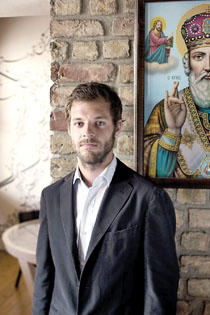| Gregoire D’Oultremont | International Business Diplomacy Associates Managing Partner |
|
Turkey (should) embrace business diplomacy |

Together with the established holdings, the so-called "Anatolian tigers” have proven to be one of the main Turkish economic powerhouses since the 1980’s, boosting growth figures with strong and performing export markets. They have slowly mastered manufacturing, quality control, sales and negotiation with their international counterparts. However, there is a missing chapter to this trade story: sound business diplomacy, backing up their expansion in existing markets and their penetration into new ones.
According to APCO, one of the leading strategic communication firms in the world, business diplomacy can be defined as “the art of thinking strategically about cross-cultural business ventures and dealing adaptively with stakeholders who have different views of the world.” Chinese business interests in Africa is one notorious example of failed--or rather, underestimated--business diplomacy. Regarded as RAW colonization, Chinese companies failed to assess the importance of perception, image and communication in a land radically foreign to them culturally, historically and ideologically. Money cannot buy everything.
Back in Turkey, companies show over-confidence in the comfort zone (read Turkestan), but this can turn into a strong sense of complex when stepping outside of it. No European knows that a single Turkish company manufactured twenty five percent of all TV sets sold in the EU. Americans also do not know that Yildiz holding (also known for its ties with the ruling conservative AKP) acquired, in 2008, their favourite Godiva praline (along with the undressed and unveiled lady riding it). A discretion or timorousness has often been attributed to Turkey’s controversial position on sensitive issues such as conservative Islam, the Kurdish/Cypriot/Armenian questions, immigration presence, and fragile domestic political equilibriums.
Pozitron, a leading Turkish mobile software developer which plans to expand its business abroad, recently told the Hurriyet Daily News: “Currently we are still in talks with other companies. But there is a general prejudice that foreigners do not want to buy technology from Turkey. This makes our job harder. That’s why instead of focusing on Europe, we prefer to expand in Central Asian and Middle Eastern countries, such as Kazakhstan and Tajikistan.”
There is an obvious lack of a coherent communication strategy in terms of solving this branding issue. Bahrain is more “business friendly” than ever; Malaysia remains “truly Asia”; Egypt is still “open for business” and Greece became “a masterpiece you can afford”. The Investment Support Promotion Agency of Turkey (ISPAT), headed by Alpaslan Korkmaz, desperately tries to hark back to 2006 FDI figures, hammering the conference audience with the outdated inbound promotion slogan “Turkey loves Turkey”. Meanwhile on the outbound, Turquality is a promising initiative but again isolated from the larger perspective. The macro approach should bring leading actors of Turkish business diplomacy around the table for a common goal: use Turkey’s domestic pride to build up an international economic reputation.
The good news is, Turkey has momentum. Youngsters find Turkey “cool”, and Istanbul is becoming a place to be, a new El Dorado for a young and dynamic EU population bored of the institutionalism, bureaucracy and ongoing debates that their parents have mostly contributed to building. In addition, there is an increasingly accepted approach to EU accession, which advocates the importance of the journey rather than the destination.
This new atmosphere has relaxed all sides of the equation. Finally, international media praise Turkey for the increasingly important diplomatic role it plays in the region. It is time for the business community to embrace that perspective, as it is not enough to join an association and open an office next to the EU parliament.
Seen by many as the missing “T” to BRIC, Turkey must now prove that not only should foreign investors come, but that there should also be Turkish companies investing abroad and proudly branding their Turkishness. For this reason, business diplomacy is an indispensable instrument to negotiate through the stormy waters of global commercial relationships so as to ensure the successful implementation of cross-border business ventures.